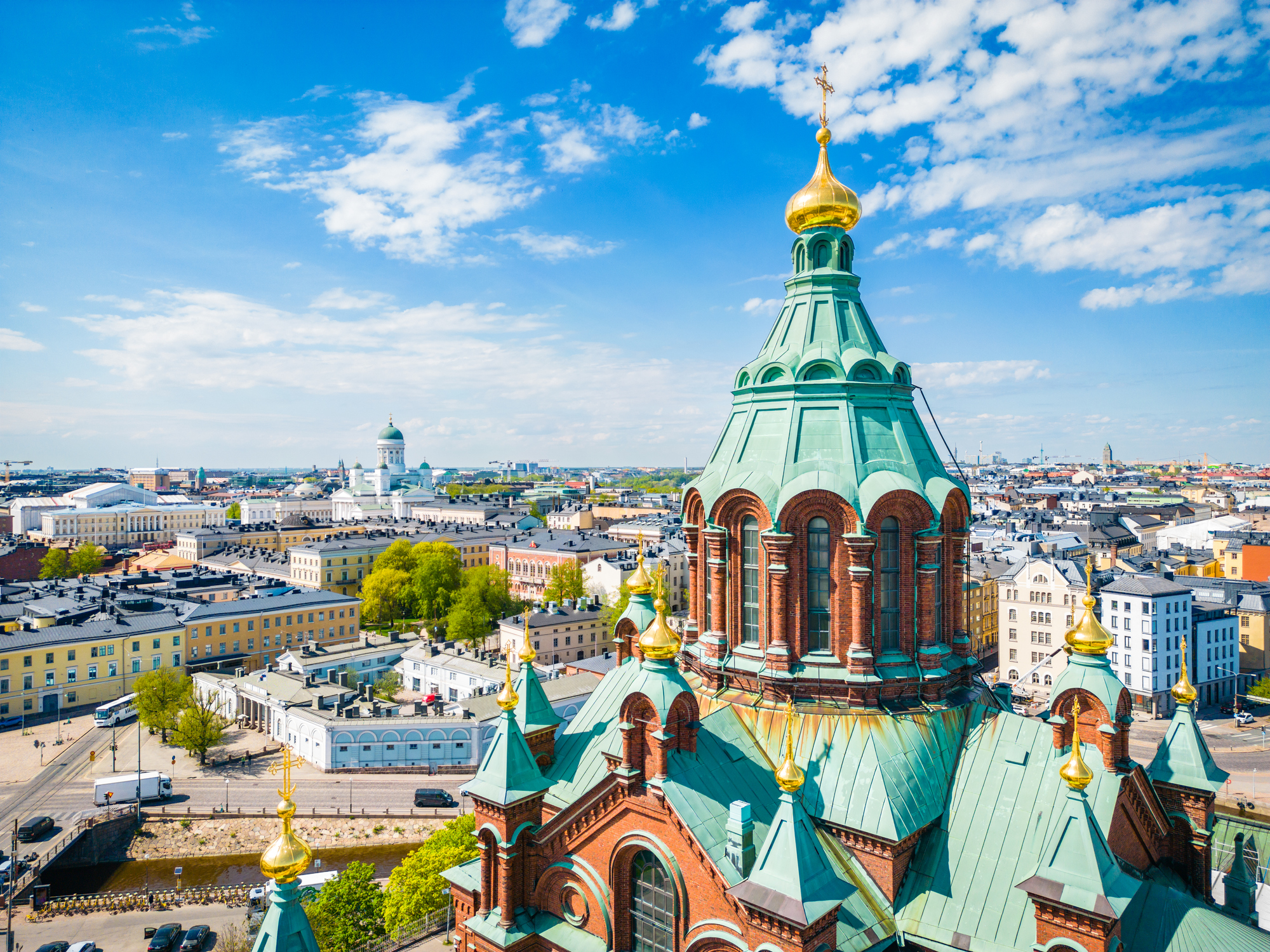‘The England team shows us Britain’s diversity is its strength’
Your digest of analysis and commentary from the British and international press

- 1. England may have lost, but Southgate’s team shows us the nation we can be
- 2. Richard Branson pulled it off
- 3. The sabotaging of Kamala Harris
- 4. A significant minority of British people revel in authoritarianism for its own sake
- 5. Matt Hancock affair highlights that we expect so little from politicians
A free daily email with the biggest news stories of the day – and the best features from TheWeek.com
You are now subscribed
Your newsletter sign-up was successful
1. England may have lost, but Southgate’s team shows us the nation we can be
Hugh Muir in The Guardian
on reason for hope
“And so we lost. After the shock and the grief, then, I guess, there is reflection and reckoning,” writes Hugh Muir in The Guardian. There is, of course, “sadness for Gareth Southgate and his squad” who have shown themselves to be “brilliant sportsmen”, but “there is still reason for hope”. This was about “so much more than football”, says Muir. As a “British, black Londoner, son of Windrush generation, working-class parents”, Muir argues that it has never been easier to support an England team. “It’s southern, it’s northern, it’s black, it’s white, it is of mixed heritage, it’s young, it’s experienced.” In short, he says, it is “instantly recognisable as young Britain right now, as seen daily – in shape and form, if not in outsized wealth – on every UK high street”. Muir concludes: “Some of us have long made the practical and moral argument that Britain’s diversity is its strength. This England team makes that case.”
The Week
Escape your echo chamber. Get the facts behind the news, plus analysis from multiple perspectives.

Sign up for The Week's Free Newsletters
From our morning news briefing to a weekly Good News Newsletter, get the best of The Week delivered directly to your inbox.
From our morning news briefing to a weekly Good News Newsletter, get the best of The Week delivered directly to your inbox.
2. Richard Branson pulled it off
Marina Koren in The Atlantic
on a new frontier
“Richard Branson was hungover on the day the Apollo 11 astronauts landed on the moon in 1969. He had turned 19 two days earlier and had celebrated accordingly,” writes Marina Koren in The Atlantic. Despite missing the moment itself, “he knew then – he was ‘instantly convinced’ – that someday he would go to space himself”. And this weekend, that’s exactly what Branson achieved with his own space company, Virgin Galactic. “And as he touched down, Branson became the first person in history to have successfully tested out his own spacecraft,” writes Koren. While “Branson’s flight did carry a scientific experiment”, his “official role in the flight, according to Virgin, was to ‘evaluate the private astronaut experience’, which is essentially a fancy way to say ‘joyride’,” writes Koren. “His flight brings us closer to an era in which rich thrill-seekers with bucket lists, not government-backed astronauts, make up the largest group of people who’ve been to space.”
A free daily email with the biggest news stories of the day – and the best features from TheWeek.com
3. The sabotaging of Kamala Harris
Sarah Baxter on UnHerd
on unwinnable assignments
“Kamala Harris began her vice-presidency in a mist of excited commentary about her role in making history. She has turned out to be isolated, frustrated, unpopular and ineffectual in office – and, right now, that suits Joe Biden’s team down to the ground,” writes Sarah Baxter on UnHerd. Indeed, “Biden knew all about her political shortcomings after watching her implode during the campaign for the Democratic presidential nomination – but went on to select her as his running mate, regardless,” Baxter writes. “The optics of having the first woman, first black and first Asian vice-president at his side were too good to resist. And then, as President, he handed her two unwinnable assignments” – solving the migrant crisis and fending off Republican voting reforms. Baxter continues: “Nobody knows Harris’s faults better than Team Biden. The truth is they thought they needed her to win, but not to govern.” But, “as the VP wanders haplessly around the White House – and country – it looks very much like the Biden camp has overdone the sabotage,” writes Baxter. “Throwing the most diverse Vice President in history to the wolves doesn’t reflect well on the Democrats, and it has left them dangerously dependent on a geriatric president.”
4. A significant minority of British people revel in authoritarianism for its own sake
Daniel Hannan in The Telegraph
on puritanical Brits
“What the hell is wrong with you people?” asks Daniel Hannan in The Telegraph. “Twenty-six per cent of you want nightclubs and casinos closed permanently, virus or no virus. Thirty-five per cent of you feel the same way about quarantining travellers and 40 per cent about mandatory facemasks.” And “incredibly, 19 per cent of you want a nightly curfew – to repeat, not as a response to Covid-19, but as a general principle.” These figures are not statistical anomalies, says Hannan. “Let’s not deceive ourselves. A significant minority in Britain revels in authoritarianism for its own sake.” He says he has learned “some hard truths about my country” during the course of the pandemic. “I used to imagine that we would reflexively favour liberty,” says Hannan. “Boy, did I get that wrong. The epidemic brought out our most petty, priggish and puritan tendencies.” “The readiness with which people slide from ‘I don’t like X’ to ‘X should be banned’ is terrifying. Obviously, we all have our own X.” However, Hannan concludes, “an open society depends on our willingness to stand up for the rights of people we don’t particularly care for. By that measure, we have already ceased to be a free country, whatever the law eventually says.”
5. Matt Hancock affair highlights that we expect so little from politicians
Mhari Aurora in The Times
on low expectations
“The assumption that politicians are hypocrites and not to be trusted points to a more sinister malaise in our society,” writes Mhari Aurora in The Times. “Irrespective of whether you believe [Matt] Hancock should have resigned or been fired, or neither,” the fact that almost no one is shocked by the breach of Covid guidelines by the former health secretary is “concerning”, she writes. Aurora asks: “how do we become a society that trusts our leaders and is shocked when they do wrong?” or “is it merely human nature that the people will always despise those who govern them?” She concludes: “I can’t help but think that we should at least try to have leaders we look up to rather than make memes out of.”
-
 Colbert, CBS spar over FCC and Talarico interview
Colbert, CBS spar over FCC and Talarico interviewSpeed Read The late night host said CBS pulled his interview with Democratic Texas state representative James Talarico over new FCC rules about political interviews
-
 The Week contest: AI bellyaching
The Week contest: AI bellyachingPuzzles and Quizzes
-
 Political cartoons for February 18
Political cartoons for February 18Cartoons Wednesday’s political cartoons include the DOW, human replacement, and more
-
 ‘Irony’ as Zoom calls staff back to office
‘Irony’ as Zoom calls staff back to officefeature And other stories from the stranger side of life
-
 The U.S. veterinarian shortage crisis
The U.S. veterinarian shortage crisisSpeed Read With an anticipated shortage of 15,000 vets by 2030, it will be harder to get care for pets
-
 Company teaches mask-wearers to smile again
Company teaches mask-wearers to smile againfeature And other stories from the stranger side of life
-
 Bees delay flight for three hours
Bees delay flight for three hoursfeature And other stories from the stranger side of life
-
 Global happiness has been 'remarkably resilient' over the past three years
Global happiness has been 'remarkably resilient' over the past three yearsfeature
-
 Ministers considered killing all cats during pandemic
Ministers considered killing all cats during pandemicfeature And other stories from the stranger side of life
-
 Kamala Harris says Russia has committed crimes against humanity in Ukraine
Kamala Harris says Russia has committed crimes against humanity in UkraineSpeed Read
-
 North Korea imposes 5-day lockdown on capital to fight 'respiratory illness'
North Korea imposes 5-day lockdown on capital to fight 'respiratory illness'Speed Read